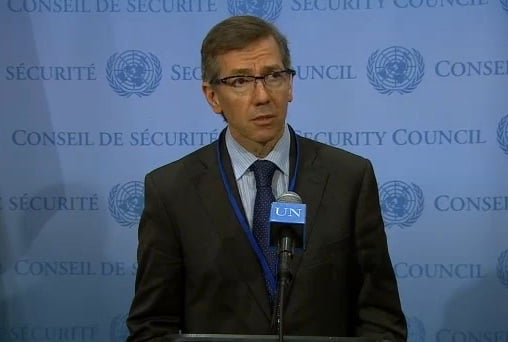By Libya Herald staff.

Tunis, 29 April 2015:
UN special envoy Bernardino Leon has said that there could be another draft proposal from . . .[restrict]the Dialogue process and it may be very different to the current proposal. He also said that he and the UN were looking to a final solution before the beginning of Ramadan in mid-June.
Speaking at a Press conference at the UN in New York after giving his latest update behind closed doors on the situation in Libya to the UN Security Council, he said that the latest proposal, the third to be drawn up, had been “very different” to the first and the fourth could equally be different. They were a “work in progress”, he suggested.
The latest plan has been rejected by the Tripoli-based continuing General National Congress (GNC) “There had been reactions from both parties already, Leon said, “some of them are critical, some of them negative”. But he was evidently sanguine about this saying that he had spoken to the GNC about their position and that they “clearly want their share of the government, of power, in future drafts”. .
“We are listening to them [both sides], of course, and trying to understand how this draft can be improved and how we can reach the consensus we want as a political solution in Libya.”
He reconfirmed that both sides, the House of Representatives (HoR) and the GNC, had until Sunday to send him comments and suggestions on Draft No. 3 to be worked on.
Delegates would then be called back to Skirat “in the coming couple of weeks”. He himself would be flying to Tunis for a meeting tomorrow with the Europe’s foreign policy chief Federica Mogherini.
She will be in the Tunisian capital to meet with HoR and GNC participants in the Dialogue.
There has been no statement whether Leon will also meet with them, but it would be strange if he did not.
At the press conference, Leon also indicated that the time for indirect negotiations between the HNC and HoR was over. He wanted to see “direct, face to face meetings as soon as possible”, he said.
He repeated the view that there could be no military solution. The country was in extremely difficult situation. Itwas “dominated by chaos” but no one side could overcome the other. However, the fighting was both affecting the dialogue and was intended to hamper it. He accused people in both camps of trying to undermine the process.
There were also those in the region causing problems but the “most important regional players”, he said, supported the dialogue. If the fighting continued, however, they along with those inside the country would bear responsibility for it – an indication that there are ideas of sanctioning them.
He also said that there would be a meeting of security officials as part of the dialogue as early as next week. A meeting of tribal leaders would also take place “soon”.
He again repeated his view that both sides had to accept compromises to reach an agreement. The outcome would not be perfect for anyone.
He also repeated that the House of Representatives was the democratically elected legislature but that at the heart of proposals so far was the Government of National Accord. At its centre was a prime minister and two deputy prime ministers who, in addition to their government roles, would also act as the country’s collective president taking over presidential powers that were assumed by the House of Representatives last August.
In this government, he suggested, both sides would have “a share”. [/restrict]







